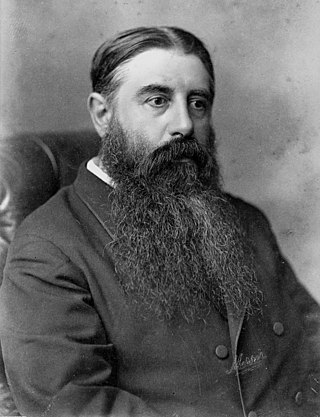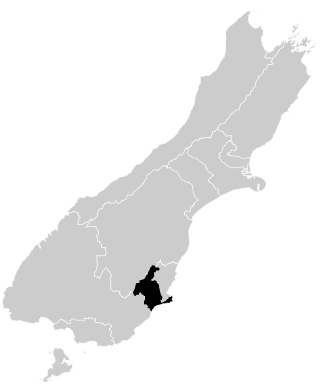Related Research Articles

Sir Julius Vogel was the eighth premier of New Zealand. His administration is best remembered for the issuing of bonds to fund railway construction and other public works. He was the first Jewish prime minister of New Zealand. Historian Warwick R. Armstrong assesses Vogel's strengths and weaknesses:
Vogel's politics were like his nature, imaginative – and occasionally brilliant – but reckless and speculative. He was an excellent policymaker but he needed a strong leader to restrain him....Yet Vogel had vision. He saw New Zealand as a potential 'Britain of the South Seas', strong both in agriculture and in industry, and inhabited by a large and flourishing population.

Dunedin is the second-largest city in the South Island of New Zealand, and the principal city of the Otago region. Its name comes from Dùn Èideann, the Scottish Gaelic name for Edinburgh, the capital of Scotland. The city has a rich Māori, Scottish, and Chinese heritage.

The 1914 New Zealand general election was held on 10 December to elect a total of 80 MPs to the 19th session of the New Zealand Parliament. The Maori vote was held on 11 December. A total number of 616,043 voters were registered, of which 84.7% voters turned out to vote.

Dunedin North is a former New Zealand parliamentary electorate, which returned one Member of Parliament (MP) to the New Zealand House of Representatives. It was established for the 1905 election and has existed since. It was last held by David Clark of the New Zealand Labour Party, who replaced the long-standing representative Pete Hodgson. It was considered a safe Labour seat, with Labour holding the seat for all but one term (1975–1978) since 1928. In the 2020 electoral boundary review, Otago Peninsula was added to the area to address a population quota shortfall; with this change the electorate was succeeded by the Dunedin electorate in the 2020 election.

Dunedin South is a former New Zealand parliamentary electorate. It first existed from 1881 to 1890, and subsequently from 1905 to 1946. In 1996, the electorate was re-established for the introduction of MMP, before being abolished in 2020.

Sir John Larkins Cheese Richardson was a 19th-century New Zealand politician, and a cabinet minister.

Caversham is one of the older suburbs (neighbourhoods) of the city of Dunedin, in New Zealand's South Island. It is sited at the western edge of the city's central plain at the mouth of the steep Caversham Valley, which rises to the saddle of Lookout Point. Major road and rail routes south lie nearby; the South Island Main Trunk railway runs through the suburb, and a bypass skirts its main retail area, connecting Dunedin's one-way street system with the Dunedin Southern Motorway. The suburb is linked by several bus routes to its neighbouring suburbs and central Dunedin.
Dunedin West was a New Zealand parliamentary electorate, in the city of Dunedin. It existed for three periods between 1881 and 1996 and was represented by seven Members of Parliament.

William Hunter Reynolds was a 19th-century businessman and Member of Parliament in Dunedin, Otago region, New Zealand. He was a cabinet minister. He is the only person who held membership on the Otago Provincial Council over the entire course of its existence (1853–1876), was Speaker of the council for three years, and was a member of the council's executive eight times.
The Gold Fields District electorate was a 19th-century parliamentary electorate in the Otago region, New Zealand. It was created in 1862, with the first elections in the following year, and it returned two members. It was one of eventually three special interest constituencies created to meet the needs of gold miners. All three of these electorates were abolished in 1870. A unique feature of the Gold Fields District was that it was superimposed over other electorates, and voting was open to those who had held a mining license for some time. As such, suffrage was more relaxed than elsewhere in New Zealand, as voting was otherwise tied to property ownership. Another feature unique to the gold mining electorates was that no electoral rolls were prepared, but voting could be done upon showing a complying miner's license.
City of Dunedin, during the first two parliaments called Town of Dunedin, was a parliamentary electorate in Dunedin in Otago, New Zealand. It was one of the original electorates created in 1853 and existed, with two breaks, until 1905. The first break, from 1862 to 1866, was caused by an influx of people through the Otago Gold Rush, when many new electorates were formed in Otago. The second break occurred from 1881 to 1890. It was the only New Zealand electorate that was created as a single-member, two-member and three member electorate.
Dunedin Suburbs is a former parliamentary electorate in the city of Dunedin in Otago, New Zealand from 1890 to 1893. The electorate was represented by one Member of Parliament, William Dawson, representing the Liberal Party.
Dunedin and Suburbs North was a parliamentary electorate in the city of Dunedin in Otago, New Zealand from 1863 to 1866. It was a multi-member electorate.
Dunedin and Suburbs South was a parliamentary electorate in the city of Dunedin in Otago, New Zealand from 1862 to 1866. From 1863 it was a multi-member electorate.
James Paterson was a 19th-century Member of Parliament in Otago, New Zealand. He was a cabinet minister, and on the Legislative Council.
Roslyn was a parliamentary electorate in the city of Dunedin in the Otago region of New Zealand from 1866 to 1890.
The 3rd New Zealand Parliament was a term of the Parliament of New Zealand. Elections for this term were held between 12 December 1860 and 28 March 1861 in 43 electorates to elect 53 MPs. Two electorates were added to this during this term, Gold Fields District and a new Dunedin electorate created by splitting the existing City of Dunedin into Dunedin and Suburbs North and Dunedin and Suburbs South, increasing the number of MPs to 57. During the term of this Parliament, six Ministries were in power.
The New Zealand Constitution Act 1852 authorised the General Assembly to establish new electoral districts and to alter the boundaries of, or abolish, existing districts whenever this was deemed necessary. The rapid growth of New Zealand's European population in the early years of representative government meant changes to electoral districts were implemented frequently, both at general elections, and on four occasions as supplementary elections within the lifetime of a parliament.
The 1862 City of Dunedin by-elections were three by-elections held in the City of Dunedin electorate in Dunedin following three resignations.
The 1863 Dunedin and Suburbs South by-election was a by-election held on 20 June 1876 in the Dunedin and Suburbs South electorate during the 3rd New Zealand Parliament. It was then a two-member electorate; the other member being William Reynolds.
References
- ↑ "Election". Otago Witness. 4 September 1863.